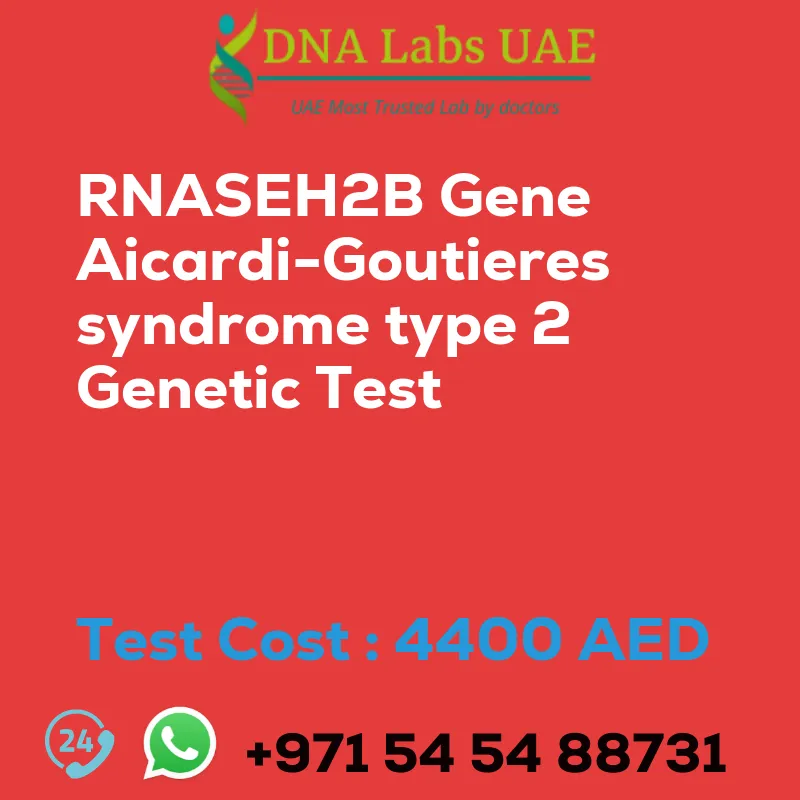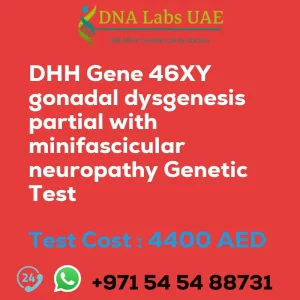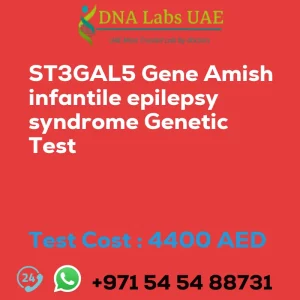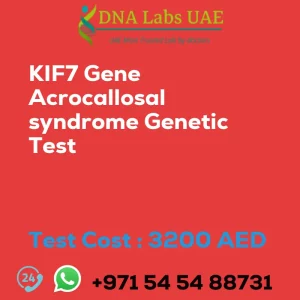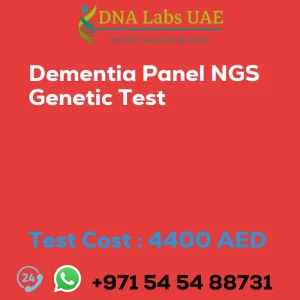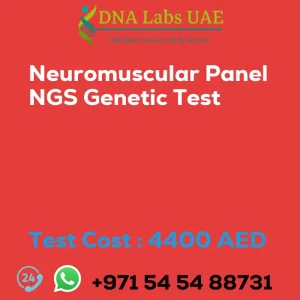RNASEH2B Gene Aicardi-Goutieres Syndrome Type 2 Genetic Test
At DNA Labs UAE, we offer the RNASEH2B Gene Aicardi-Goutieres Syndrome Type 2 Genetic Test to diagnose and identify this rare genetic disorder. This test is specifically designed to detect mutations in the RNASEH2B gene, which is associated with Aicardi-Goutieres Syndrome Type 2.
Test Components and Price
Test Name: RNASEH2B Gene Aicardi-Goutieres Syndrome Type 2 Genetic Test
Components: Blood or Extracted DNA or One drop Blood on FTA Card
Price: 4400.0 AED
Test Details
Aicardi-Goutieres Syndrome Type 2 is a rare genetic disorder that affects the brain and immune system. It is caused by mutations in the RNASEH2B gene, which plays a crucial role in DNA repair. When this gene is mutated, it disrupts the normal function of the protein it produces, leading to the accumulation of damaged DNA in cells and triggering an inflammatory response in the body.
To diagnose Aicardi-Goutieres Syndrome Type 2, we utilize NGS (next-generation sequencing) technology. This advanced genetic testing method allows us to sequence the entire RNASEH2B gene, identifying any variations or mutations that may be present. NGS testing provides a more comprehensive analysis of genetic variations compared to traditional methods that only focus on specific regions of the gene.
Test Type and Doctor
Test Type: Neurological Disorders
Doctor: Neurologist
Test Department and Pre-Test Information
Test Department: Genetics
Pre-Test Information: Before undergoing the RNASEH2B Gene Aicardi-Goutieres Syndrome Type 2 Genetic Test, it is important to provide the clinical history of the patient. Additionally, a genetic counseling session will be conducted to draw a pedigree chart of family members affected by Aicardi-Goutieres Syndrome Type 2.
Report Delivery and Method
Report Delivery: 3 to 4 Weeks
Method: NGS Technology
Who Should Take the Test?
NGS genetic testing for Aicardi-Goutieres Syndrome Type 2 is recommended for individuals who exhibit symptoms of the disorder or have a family history of the condition. The test can confirm a diagnosis and provide information about the inheritance pattern of the condition. It can also be used for carrier testing in individuals with a family history of the disorder but do not show any symptoms.
| Test Name | RNASEH2B Gene Aicardi-Goutieres syndrome type 2 Genetic Test |
|---|---|
| Components | |
| Price | 4400.0 AED |
| Sample Condition | Blood or Extracted DNA or One drop Blood on FTA Card o |
| Report Delivery | 3 to 4 Weeks |
| Method | NGS Technology |
| Test type | Neurological Disorders |
| Doctor | Neurologist |
| Test Department: | Genetics |
| Pre Test Information | Clinical History of Patient who is going for RNASEH2B Gene Aicardi-Goutieres syndrome type 2 NGS Genetic DNA Test A Genetic Counselling session to draw a pedigree chart of family members affected with RNASEH2B Gene Aicardi-Goutieres syndrome type 2 |
| Test Details |
The RNASEH2B gene is associated with Aicardi-Goutieres syndrome type 2, a rare genetic disorder that affects the brain and immune system. The RNASEH2B gene provides instructions for making a protein that is involved in repairing DNA damage. Mutations in this gene can disrupt the normal function of the protein, leading to the accumulation of damaged DNA in cells and triggering an inflammatory response in the body. NGS (next-generation sequencing) genetic testing can be used to identify mutations in the RNASEH2B gene that are associated with Aicardi-Goutieres syndrome type 2. This type of testing involves sequencing the entire gene to identify any variations or mutations that may be present. NGS testing can provide a more comprehensive analysis of genetic variations than traditional genetic testing methods, which may only focus on specific regions of the gene. NGS genetic testing for Aicardi-Goutieres syndrome type 2 may be recommended for individuals who have symptoms of the disorder or who have a family history of the condition. Testing can help to confirm a diagnosis and provide information about the inheritance pattern of the condition. It may also be used for carrier testing in individuals who have a family history of the disorder but do not show any symptoms. |

